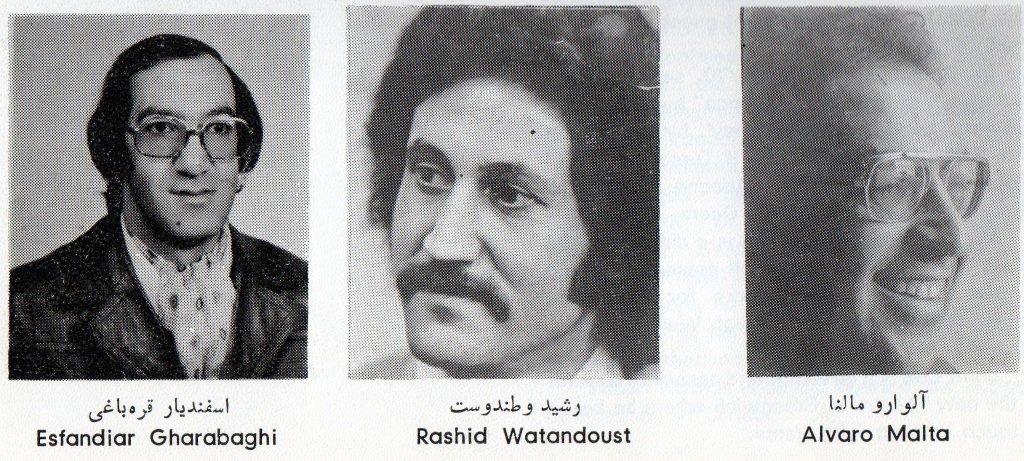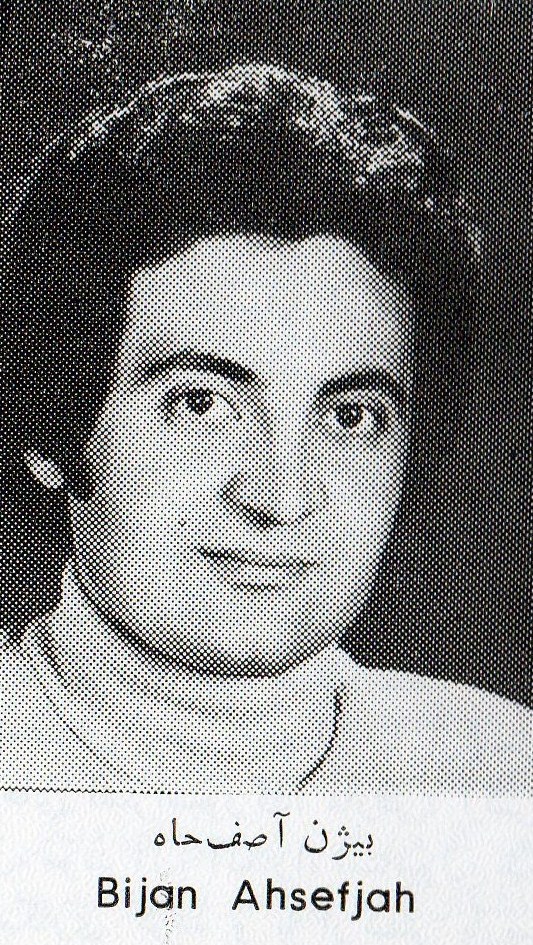
ROUDAKI HALL, part three
by Liliana Osses Adams

(Photos from Tehran Opera House,”Werther”by Jules Massenet, 1977, courtesy Liliana Osses Adams, private collection)
Álvaro Malta
The Bailiff in Massenet’s “Werther”, Tehran Opera House, April 1977
Álvaro Malta, Portuguese operatic basso was born in 1931 in Lisbon. He began his music education in his native city. At an early age he sang in the choir at Theatre Lyric and at the Trinity. In 1951, he made his singing début in the Requiem of Mozart. His acclaimed stage début was made in March 1958 at Teatro San Carlo in Lisbon during the legendary performance of Maria Callas in Verdi’s “La Traviata”, conducted by Franco Ghione with Alfredo Kraus as Alfredo Germont and Álvaro Malta as Baron Duphol, Violetta’s lover. His repertory included the major bass roles such as: Figaro in Mozart and Rossini, Mephisto in Gounod’s “Faust”; Timur in Puccini’s Turandot”; Il Commendatore in Mozart’s “Don Giovanni”; The Bailiff in Massenet’s “Werther”, and as Father Trulove in “The Rake’s Progress” by Stravinsky. During the assignments of conductor Albert Rosen at the Wexford Festival, Álvaro Malta appeared in Massenet’s “Hérodiade” as Phanuel (1977); in Eugen d’Albert’s “The Lowlands” (Tiefland) as Tommaso (1978), and as the barbarian king Archibaldo in “L’Amore Dei Tre Rei” by Italo Montemezzi with libretto by Sem Benelli (who also provided the text for Giordano’s “La Cena delle Beffe”, performed under the baton of Maestro Nino Bonavolontà in 1972).
Throughout his career at opera houses in Europe he performed alongside opera singers of international fame such as Franco Corelli, Tito Gobbi, Boris Christoff, Nicolai Gedda, Giuseppe Di Stefano, Rita Gorr or Régine Crespin. In 1989 he sang his last performance as Uberto, an elderly bachelor in Pergolesi’s “La Serva Padrona”.
In Roudaki Hall April 1977 production of “Werther”, Álvaro Malta performed with comic flair the widowed Bailiff who taught his six younger children the songs of Noël in July. And then applauded as an effective actor with a voluminous voice, he returned as Pistol in Verdi’s “Falstaff” in December, 1977. Next to his fellow Bardolfo “a companion in crime”, sang by tenor Pietro di Vietri and drolly comical merry wives of the tale, Sir John Falstaff of Giuseppe Taddei brought to the stage the best professional achievements of Verdi’s final opera led by Farshad Sanjari, acclaimed as “Wunderkind” by the Austrian press.
Rashid Vatandoust
Schmidt in Massenet’s “Werther”, Tehran Opera House, 1977
Rashid Vatandoust, an Iranian native made his mark as a comprimario tenor singer appearing during more than six years in many opera performances in supporting roles, such as Schmidt in “Werther” singing with his buddy Johann “Vivat Bacchus” and waiting to meet the Bailiff, Charlotte’s father, later that night at Inn “Raisin d’Or”.
Esfandiar Gharabaghi
Johann in Massenet’s “Werther”, Tehran Opera House, 1977

Jules Massenet’s “Werther” was one of the newest additions to the repertory produced by Bijan Ahsefjah (Assefjah) who, on March 1976, replaced Enayat Rezai as Director of Tehran Opera.
Bijan Ahsefjah, an operatic tenor and stage director was born in 1940 in Tehran. He began voice study at the Conservatory of Music in Tehran. He also studied architecture at Tehran University. At an early age, he went to the USA to continue his education at Cincinnati Conservatory of Music. The scholarship given from Walt Disney Foundation and the Corbett Foundation allowed him to study at California Institute of Art in Los Angeles. He pursued his study at Opera Studio in Zurich with Lotfi Mansouri, and then with Italo Tajo. He participated in the summer training programs for opera singers and stage performers at the Opera in the Ozarks at Inspiration Point, Eureka Springs, Arkansas under Dr. Issac Van Grove.
His mentors were Nike Wagner and Natalie Limonick from UCLA Opera Workshop; his voice coach was George London and his vocal advisor was Ernst St. John Metz (known as Jack Metz) at Los Angeles Music Center Opera. Director Frank Corsaro from Actors Studio in New York provided some operatic directing advice. He won the Professor Fuch’s Memorial Award at Julliard School of Music in New York. He was a member of the American Theatre Union and a naturalized American citizen. He made his stage début in Donizetti’s “Lucia di Lammermoor” at Gran Teatro del Liceo in Barcelona (1971).
In 1974, Bijan Assefjah appeared at Roudaki Hall as Sandor Barinkay in the production of Johann Strauss’s “Der Zigeunerbaron”, directed by Dr. Walter Eichner and conducted by Hans-Peter Rauscher, substituting Kurt Herbert Adler.
In 1975, he was appointed a Coordinator Director at the company; in the next year, he had succeeded as Tehran Opera Director. During the last season (in lieu of four to six new opera productions added to the repertory each year) the company introduced only one, the much anticipated “Tristan und Isolde” of Richard Wagner, directed by Wolfgang Siegfried Wagner, under the baton of Matthias Kuntzsch, and with scenery and costumes designed by Uwe Thill-Pellworm. The cast on January 10, 14, and 16, 1978, included: Gerd Brenneis as Tristan; a Polish born soprano, Rose Wagemann as Isolde; Sylvia Anderson as Brangäne; Rudolf Holtenau as Kurwenal; Tugomir Franc as King Marke of Cornwall; William Mc Kinney as Melot, and Rashid Watandoust as A Shepherd.
On June, 1978, the Roudaki Hall activities were interrupted by the Iranian Revolution of 1979. The new government considered music as a promotion of Western culture against Islamic values and imposed severe new Islamic law and restrictions. Many Iranian artists, singers, musicians, conductors, composers, and pop singers immigrated to Europe and to the United States; those who stayed in the country remained in almost total isolation and those who left had a difficult task to resolve: how to integrate and to compete in new international artistic environments?
On February 1980, I met Bijan during the intermission at Wiener Staatsoper with Hermann Prey as Mozart’s Figaro. We immediately exchanged our addresses and telephones. Soon after, my husband and I visited Bijan and his wife Wendy, an English concert flutist from Tehran Symphony Orchestra, their infant baby and daughter Anahita (who later become a soprano opera singer) at their Vienna home at Saarplatz, in 19th Bezirk. Then, he moved with his family to Germany and resided for a while at Sollher Straβe in Munich. In this time of his life, Bijan Ahsef-Jah became stage producer in the National Theater in Munich (1980-1983). As an adept singing teacher, he began to give voice instructions to young German singers. In the years to follow, he continued to stage operas in Germany, France, Italy, and in North America.
He produced, among others: Mozart’s “Die Entführung aus dem Serail” at Opéra de Monte-Carlo (February 17, 1988); Rossini’s “La Cenerentola” in Palm Beach Opera, Florida (1990), and Mozart’s “ Die Zauberflöte” in Baltimore Opera Company (1992).
His last work was an operatic production of TV-Trailer of Mozart’s “Le nozze di Figaro” in 2006 at Kiebitzberg Shipyard in Havelberg under the baton of Reinhard Seehafer with Philharmonic Orchestra of Europe (POE).
A few months later, Bijan Ahsef-Jah passed away on December, 2, 2006, in Nuβdorf, Bavaria.
Peace and prayers for those who left us.
Additional information of interest includes official web sites and youtube uploads:
Monir Vakili www.monirvakili.com
Ahmad Pejman www.ahmadpejman.com
Loris Tjeknavorian www.loristjeknavorian.com;
Ali (Alexander) Rahbari www.alirahbari.com
Anahita Ahsef http://ahsef.com;
Robert de Warren http://robertdewarren.org
Leo Goeke: Stravinsky’s “The Rake’s Progress”, Glyndebourne Festival (integral)
Hossein Sarshar:
Hossein Sarshar's movie clip from "The Tenants" (Ejareh-Nesheenha) singing the prologue from Pagliacci (1986)
Vocal recital performed at Farhang Hall, Tehran, 1968 (audio excerpts)
“Dreams of a little Devil” by Morteza Hannaneh with Fakhereh Saba, 1965 (audio recording)
Rashid Watandoust and Ramin Jamalpour on piano (audio)
Bijan Ahsef-Jah: Europa Philharmonie TV-Trailer „Le nozze di Figaro“, 2006 (short interview)
Koorosh Yazdani, a former Tehran Opera chorister, composed and performed the CD album “The Fish (Mahi)” based on modern Persian poetry with the title song after a poem by Ahmad Shamloo, the librettist of “Zal and Roudabeh” by Samin Baghcheban performed at Roudaki Hall.
Last but not least: I am thankful to Dir. Enayat Rezai for his recent responses to my queries.
© Liliana Osses Adams, California, Autumn, 2012
For further comments or corrections, please contact: harpliliana@comcast.net